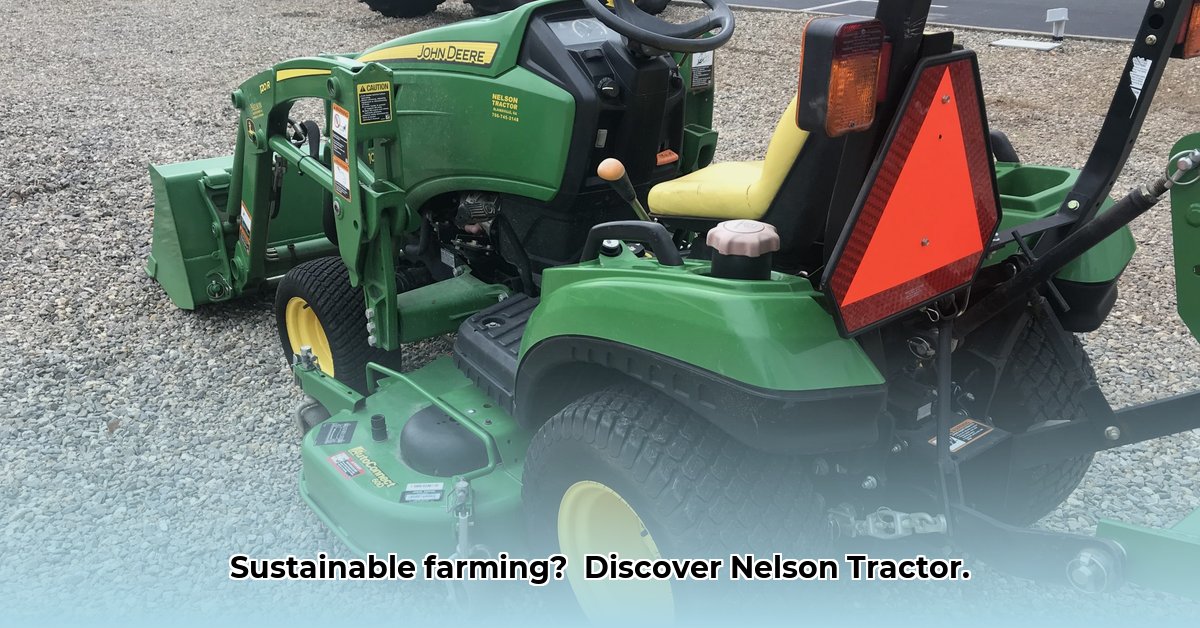
Understanding Nelson Tractor's Role in North Georgia Agriculture
Nelson Tractor, a Blairsville, Georgia institution for over 75 years, deeply impacts the region's agricultural landscape. This case study examines its contribution to sustainable farming practices, considering equipment offerings, internal operations, and community engagement. With additional locations in Jasper and Dalton, Nelson Tractor serves a wide swath of North Georgia farmers. However, a comprehensive assessment requires analyzing its alignment with evolving sustainable agriculture principles. Does Nelson Tractor's long history translate into a proactive commitment to environmentally responsible farming? For more information on Blairsville's local tractor supplier, visit this website.
North Georgia's Agricultural Context: Challenges and Opportunities
North Georgia's agriculture faces unique challenges. The region's varied climate, soil composition (ranging from fertile river valleys to rocky uplands), and water availability influence crop selection and farming techniques. Common crops include hay (vital for livestock), soybeans, and various fruits and vegetables. Soil erosion, water management, and fertilizer runoff are significant environmental concerns. Understanding these contextual factors is crucial for evaluating Nelson Tractor's role in promoting sustainable solutions. How effectively does its equipment and support mitigate these challenges?
Nelson Tractor's Equipment and Sustainability
Nelson Tractor offers a broad range of equipment from major manufacturers like Kubota and New Holland, known for reliability. While this implicitly supports sustainability through equipment longevity, the dealership needs to explicitly demonstrate its commitment to environmentally friendly machinery. Does their inventory include fuel-efficient models and precision agriculture technology? Precision technology (like GPS-guided planting and spraying) optimizes resource use, minimizing waste. Further research is needed to quantify the fuel efficiency and emission reduction capabilities of their equipment. Does Nelson Tractor prioritize the sale and service of equipment designed to minimize soil compaction? This is a critical aspect of soil health and long-term sustainability. The company's commitment to providing prompt repairs and readily available parts also adds to the sustainability narrative; fewer equipment replacements reduce overall environmental impact.
Assessing the Environmental Impact of Nelson Tractor's Operations
The environmental impact extends beyond the equipment itself. Nelson Tractor's internal operations—energy consumption, waste management, and supply chain practices—require scrutiny. Does the company utilize energy-efficient practices in its facilities? What waste reduction and recycling programs are in place? Does Nelson Tractor prioritize environmentally responsible suppliers for parts and equipment? This level of transparency is crucial for a complete sustainability assessment.
Community Engagement and Farmer Feedback
Nelson Tractor’s success hinges on its relationship with local farmers. Does the company actively educate customers on sustainable farming techniques? Do they offer workshops or training sessions on resource-efficient practices? Gathering formal customer testimonials quantifying the benefits of sustainable practices implemented with the assistance of Nelson Tractor is essential. Are there documented examples of farmers adopting more sustainable practices due to Nelson Tractor's support or training? This would showcase the dealership's positive impact on the community.
Analysis & Discussion: Strengths, Weaknesses, and Areas for Improvement
Strengths:
- Long-standing community presence and established customer relationships.
- Wide range of equipment and comprehensive service capabilities.
- Implicit support of sustainability through reliable, long-lasting equipment.
Weaknesses:
- Limited publicly available data on specific sustainability initiatives.
- Absence of quantifiable data on the environmental impact of its equipment and services.
- Lack of readily documented evidence of customer engagement in sustainable practices.
Recommendations for Nelson Tractor and the Broader Community
Nelson Tractor can significantly enhance its sustainability efforts by:
- Conducting life cycle assessments (LCAs) of its equipment: LCAs quantify the environmental impact of each machine from production to disposal.
- Developing case studies: Showcase local farmers successfully using Nelson Tractor equipment for sustainable practices. Quantify improvements in resource efficiency and environmental impact.
- Partnering with sustainable agriculture organizations: Collaborate on educational initiatives to promote best practices among farmers.
- Investing in employee training: Equip staff with the knowledge to advise farmers on sustainable farming strategies.
- Improving website transparency: Publicly share sustainability initiatives, LCA results, and farmer success stories.
Conclusion: Charting a Sustainable Course
Nelson Tractor holds significant potential to become a leader in sustainable agriculture in North Georgia. By adopting the recommendations outlined above, it can strengthen its position within the community and contribute meaningfully to the region's environmental stewardship. This commitment to transparency and continuous improvement will solidify its role as a responsible business partner for local farmers. The future of North Georgia agriculture depends on such collaborative efforts between businesses and the community.